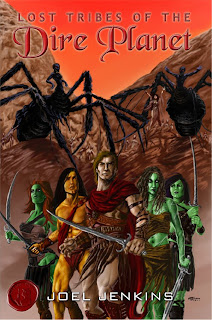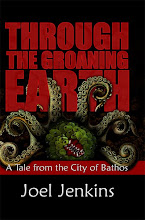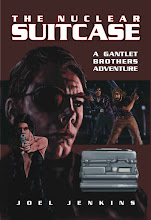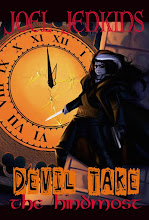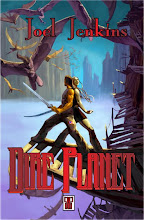One Foot in My Grave
September Peterson has received death sentences many times from well-meaning doctors speaking in hushed tones. Living with cystic fibrosis means that he'll die from cystic fibrosis--a long and excruciating death--unless, by tempting fate, he can find a quicker, faster way to go.
When September's cheerleader fiancee dumps him for a college man, September picks fast cars, motorcycles, and hard alcohol to do the trick, then witnesses his life unravel into a series of death defying encounters--all the while battling his own inner demons.
OK Corral Article
This extremely short article appeared in Science Fiction Trails #10.
Weird Worlds of Joel Jenkins
From an ancient temple in the icy Martian mountains to a forbidden road haunted by the ghost of an Indian brave, this collection of tales will take you on a thrilling journey. Meet vampire hunters, a rock musician who takes on the heavyweight champion of the world, the reluctant warrior of the mystical land of Saffronyia, giant Nazi robots, and the Mormon gunfighter Porter Rockwell ... as well as a few hungry apes and one very lovely assassin.
Strange Trails
This contains a Lone Crow story titled The Steam Devil (written by me), not to mention a Mr. Brass story by Josh Reynolds and some other awesome stuff.
Six-Guns & Space Ships
This contains a nifty tale, Shootout at Hangar 2112, about Captain Barclay and his motley crew of intrepid spaceway salvagers, who find themselves on a hit list, and besieged by deadly bounty hunters from the dark corners of the galaxy.
Jim Anthony: Super Detective #4
The classic pulp character Jim Anthony returns in a collection of stories which includes The Scream Hammer, in which Anthony uncovers a Nazi plot, a secret super weapon, and scrambles to save the love of his life.
The Gantlet Brothers: Sold Out

When one of the infamous Gantlet Brothers is slain in an assassination that was intended to kill them all, the remaining brothers go on the warpath. From the sunny shores of Puerto Rico to the dank back alleys of London, and behind the Iron Curtain of communist Czechoslovakia, the Gantlets hunt the cadre of assassins responsible for their brother’s death, uncovering conspiracies and plots as they work their way back to the criminal warlord that is behind it all.
The PulpWork Christmas Special 2013
I contributed the fourth and final story, The Shadow Killers, to this collection. in which cold-hearted assassin Monica Killingsworth finds herself the reluctant, but extremely well paid, escort of a small child and becomes the target of merciless killers ... some of which she has worked with before.
Robots Unleashed
And coming in just under the wire for 2013 is Robots Unleashed! which includes a tale about expert escape artist, The Eel, and master of disguise, The Adder, as well as giant Nazi robots.
That makes 2 novels, 1 collection, 1 article, and 5 novellas and short stories to see print this year. Not too bad for a worthless layabout like myself. Next year I've got just one book scheduled, the highly anticipated (and by that I mean at least four people have mentioned they are looking forward to it) Lone Crow collection of weird west stories, The Coming of Crow. What else 2014 will bring only heaven knows.












